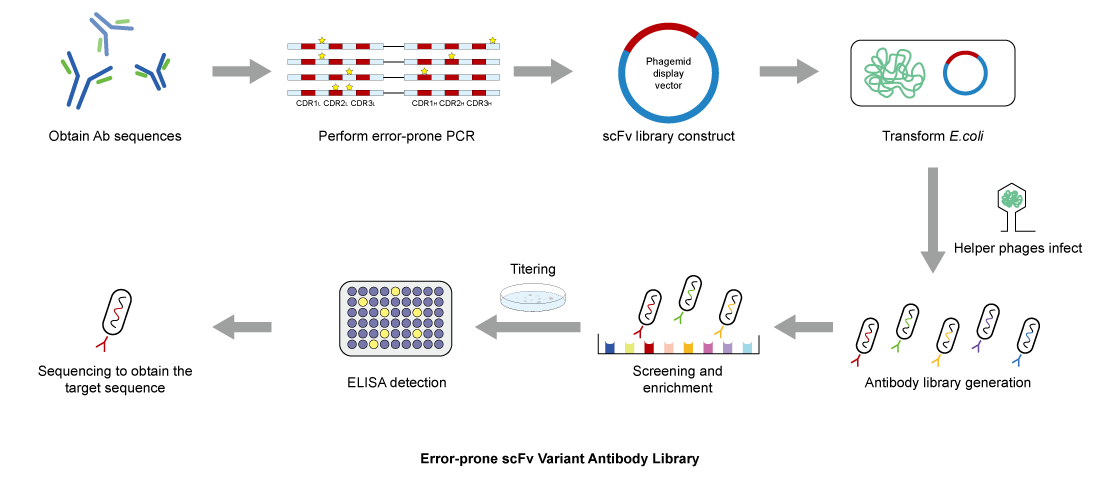General Introduction of Error-prone scFv Variant Antibody Libraries
Synthetic antibody libraries are instrumental in designing, constructing, and successfully generating highly functional antibodies for various applications. Their optimized framework sequences provide a strong scaffold, while controlled diversity in the CDRs offers distinct advantages over natural antibodies.
Random mutagenesis and error-prone PCR are commonly used to create diverse scFv
antibody libraries. The mutagenesis can target the entire V(D)J region or only the complementarity-determining regions (CDRs) of the antibody. As a result, mutations can occur throughout the entire scFv sequence or be concentrated in the CDRs., These libraries can be extremely large, offering a wide range of options for in vitro screening and expanding possibilities in antibody functionality research.
Highlights
-
![]()
- High Diversity
Quality design leads to high diversity of the recombinant antibody libraries
-
![]()
- High Quality Libraries
The updated phage display system provides a guarantee for larger storage capacity and highly functional antibodies
-
![]()
- Cost-Effective
Competitive prices and affordable services
Service Details
|
Process
|
Details
|
Deliverables
|
Turnaround Time
|
|
Template sequence construction
|
Clone the template sequence in pUC57 vector.
|
• Template sequence construct
• Variable fragment phagemid library and COA
|
1-2 weeks
|
|
Vector construction
|
Perform error-prone PCR and clone scFv in the antibody expression vectors.
|
2-3 weeks
|
|
Transform E.coli and Library constructio
|
Transform the constructs into TG1 competent cells, then prepare the plasmid and identify the capacity and accuracy of the library.
|
2-3 weeks
|
Workflow
Resources
Get in Touch with Us
Related Services
 DNA Synthesis
DNA Synthesis Vector Selection
Vector Selection Molecular Biology
Molecular Biology Oligo Synthesis
Oligo Synthesis RNA Synthesis
RNA Synthesis Variant Libraries
Variant Libraries Genome KO Library
Genome KO Library Oligo Pools
Oligo Pools Virus Packaging
Virus Packaging Gene Editing
Gene Editing Protein Expression
Protein Expression Antibody Services
Antibody Services Peptide Services
Peptide Services DNA Data Storage
DNA Data Storage Standard Oligo
Standard Oligo Standard Genome KO Libraries
Standard Genome KO Libraries Standard Genome Editing Plasmid
Standard Genome Editing Plasmid ProXpress
ProXpress Protein Products
Protein Products





























